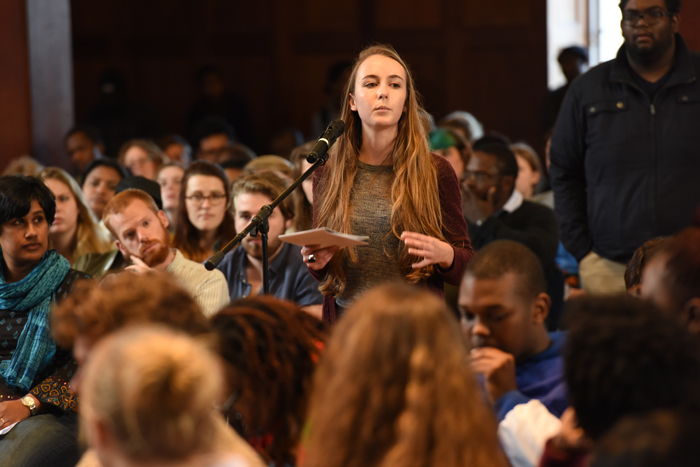How to destigmatise the Humanities' extended-degree experience?
06 April 2016 | Story Yusuf Omar. Photo Michael Hammond.
How does the university deal with the stigma attached to students who are registered for the Humanities faculty's extended-degree programme? This question was unpacked during one of the sessions at the Teaching and Learning Conference*, which took place on 30 March 2016.
Dr Shannon Morreira, who teaches on the extended-degree programme, and Luvuyo Mdlalo explored issues experienced by some students who are enrolled in the Humanities' Education Development Unit (EDU), which allows selected students to complete a three-year Humanities course over four years. These students felt “racialised” in their UCT experience and suggested that being part of the EDU contributed to an environment in which they felt patronised.
Mdlalo, the academic representative on the EDU Students' Representative Council, elaborated on issues that he recalled were raised at the Faculty of Humanities' transformation assembly in August 2015. Some EDU students said they felt like outsiders in the faculty, while some complained that some course names were “demeaning”, said Mdlalo.
The lack of clear communication about being placed in the extended-degree stream before registering at UCT compounded the problem, said Mdlalo. Often, students were unsure about what being in the EDU stream meant for their studies, or why they had been placed there. More broadly, Mdlalo said that many EDU students advocated a more Afrocentric curriculum and were pushing for more African literature and scholarship in course reading lists.
Morreira, bemoaned the habit of “deficit thinking” at the university.
“It's assumed that students on EDU need to be brought up to speed with the rest of the university,” she said. “We're finding creative ways to counter this.”
How funding racialises the EDU programme
Funding is their biggest stumbling block, said Morreira. By law, funding for EDU programmes is strictly for students from previously disadvantaged groups. While intended as positive discrimination, it has had the effect of creating “blacks only” classes. For a black student who may already have experienced various challenges at the university, this compounded feelings of being marginalised, said Morreira.
EDU students are required to pass 21 or 22 courses in order to graduate, while students in the three-year stream are required to pass only 20. The EDU is lobbying for the 21/22-course degree to be standardised across the faculty. They would also like to see compulsory initial courses that nurture a critical awareness of the local, African and global south socio-political context, as they are in the EDU stream.
“Speaking about the four-year degree as separate from the university is really not going to get us anywhere,” concluded Morreira.
Decolonising the curriculum
The theme of an Africanised curriculum was prominent in another presentation at the Teaching and Learning Conference. Kgaugelo Sebidi, a postgraduate student, called for more “contextualised knowledges” in course curricula while he compared EDU students' experiences of two first-year sociology courses.
Students found the first semester course, Introduction to Sociology, to be overly Eurocentric, with figures like Friedrich Engel, Karl Marx and Emile Durkheim dominating course readers. Many students keenly felt the lack of African scholarship in their introduction to sociology, said Sebidi.
The second-semester course, Individual and Society, however, analysed core sociological concepts by looking at how they manifested locally. Sebidi illustrated his point about foregrounding the local context in curricula with an anecdote about a student from Khayelitsha.
The second-semester course has a strong focus on health issues, including the scourge of tuberculosis in poor Cape Town communities. Sebidi said that the student in question had first-hand experience of TB – his family, including himself, had contracted the disease. He was therefore able to relate to the course's depiction of the struggle to treat the disease and manage its devastating impact.
Sebidi's argument is to “entwine students' experiences with the curriculum” wherever possible.
*The 2015 Teaching and Learning Conference, convened by UCT's Centre for Innovation in Learning and Teaching was deferred from October 2015 to 30 March 2016 after the Fees Must Fall protests.
 This work is licensed under a Creative Commons Attribution-NoDerivatives 4.0 International License.
This work is licensed under a Creative Commons Attribution-NoDerivatives 4.0 International License.
Please view the republishing articles page for more information.










